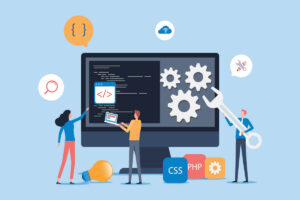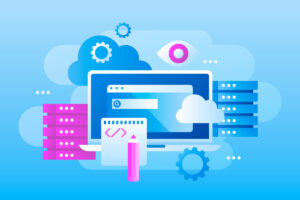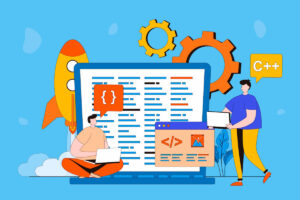Full Stack PHP development is constantly evolving, with new trends and technologies emerging regularly. In this article, we will explore some of the latest trends in Full Stack PHP development that developers need to be aware of to stay competitive in today’s fast-paced tech industry.
Microservices Architecture
One of the most significant trends in Full Stack PHP development is the shift towards microservices architecture. Instead of building monolithic applications, developers are breaking down their applications into smaller, more manageable services that can be developed, deployed, and scaled independently. This approach allows for greater flexibility, scalability, and resilience in modern web applications.
- Microservices enable teams to work on different services simultaneously, improving productivity and speed of development.
- Each microservice can be developed using different technologies, allowing developers to choose the best tools for each specific task.
- By breaking down applications into smaller components, microservices architecture makes it easier to identify and fix issues, leading to more robust and reliable applications.
Serverless Computing
Serverless computing is another trend that is revolutionizing Full Stack PHP development. With serverless architectures, developers can focus on writing code without worrying about managing servers or infrastructure. Platforms like AWS Lambda, Google Cloud Functions, and Azure Functions allow developers to run code in response to events without provisioning or managing servers, making it easier to build scalable and cost-effective applications.
- Serverless computing reduces operational costs by only charging for the actual resources used, rather than for maintaining idle servers.
- Developers can quickly scale applications based on demand without having to manage server provisioning or configurations.
- Serverless architectures promote a more event-driven approach to development, leading to more responsive and efficient applications.
Progressive Web Apps (PWAs)
Progressive Web Apps (PWAs) are web applications that provide a native app-like experience on the web. They combine the best features of web and mobile applications to deliver fast, reliable, and engaging user experiences. In Full Stack PHP development, PWAs are becoming increasingly popular due to their ability to work offline, send push notifications, and provide a seamless user experience across devices.
- PWAs use service workers to cache assets and data, allowing users to access content even when offline.
- By leveraging web technologies like HTTPS and responsive design, PWAs ensure a secure and consistent user experience across different devices.
- PWAs can be installed on users’ devices, making it easier to engage with users and drive repeat visits to the application.
Headless CMS
Headless CMS is a content management system that separates the backend content management from the frontend presentation layer. In Full Stack PHP development, developers are increasingly using headless CMS platforms like Strapi, Contentful, and Prismic to create flexible and customizable content management solutions for their applications. This decoupling of content and presentation allows for greater flexibility, scalability, and performance in modern web applications.
- Headless CMS enables developers to create content once and deliver it across multiple channels and devices seamlessly.
- Developers can use APIs to retrieve content from the CMS and display it in different formats, such as websites, mobile apps, or IoT devices.
- By separating content management from presentation, developers have more control over the user experience and can easily update content without affecting the frontend design.
GraphQL
GraphQL is a query language for APIs that allows developers to request only the data they need from the server. In Full Stack PHP development, GraphQL is gaining popularity as an alternative to traditional REST APIs due to its flexibility, efficiency, and developer-friendly features. By using GraphQL, developers can create more efficient and powerful APIs that provide a better user experience and improve performance in their applications.
- With GraphQL, developers can specify the exact data they need for a particular request, reducing the amount of data transferred over the network.
- GraphQL schemas provide a clear and structured way to define data models, making it easier to understand and maintain APIs.
- By enabling clients to request only the required data, GraphQL improves performance and reduces the number of network requests needed to fetch data.
DevOps and Automation
DevOps practices and automation tools are essential in modern Full Stack PHP development. By implementing continuous integration, continuous deployment, and automated testing processes, developers can streamline their development workflows, improve code quality, and accelerate the delivery of new features and updates. Tools like Docker, Kubernetes, Jenkins, and GitLab CI/CD are commonly used in Full Stack PHP development to automate the deployment and management of applications.
- Continuous integration allows developers to merge code changes frequently, detect issues early, and maintain a stable codebase.
- Continuous deployment automates the release process, ensuring that new features are delivered to users quickly and efficiently.
- Automated testing helps identify bugs and issues early in the development cycle, improving overall software quality and reliability.
Conclusion
In conclusion, Full Stack PHP development is constantly evolving, with new trends and technologies shaping the future of web development. By staying informed about the latest trends in Full Stack PHP development, developers can stay ahead of the curve and build modern, scalable, and efficient web applications that meet the demands of today’s digital world.
This article is for informational purposes only and does not constitute professional advice. It is recommended to consult with a qualified professional for specific guidance on Full Stack PHP development.
FAQs:
What is microservices architecture in Full Stack PHP development?
Microservices architecture is the trend of breaking down applications into smaller, more manageable services that can be developed, deployed, and scaled independently, allowing for greater flexibility, scalability, and resilience in modern web applications.
How does serverless computing revolutionize Full Stack PHP development?
Serverless computing allows developers to focus on writing code without managing servers or infrastructure. Platforms like AWS Lambda, Google Cloud Functions, and Azure Functions enable running code in response to events without provisioning servers, making it easier to build scalable and cost-effective applications.
What are Progressive Web Apps (PWAs) in Full Stack PHP development?
Progressive Web Apps (PWAs) are web applications that provide a native app-like experience on the web, combining the best features of web and mobile applications for fast, reliable, and engaging user experiences. PWAs can work offline, send push notifications, and offer a seamless user experience across devices.
How does Headless CMS impact Full Stack PHP development?
Headless CMS is a content management system that separates backend content management from the frontend presentation layer. In Full Stack PHP development, using platforms like Strapi, Contentful, and Prismic allows for creating flexible and customizable content management solutions, leading to greater flexibility, scalability, and performance in modern web applications.












+ There are no comments
Add yours